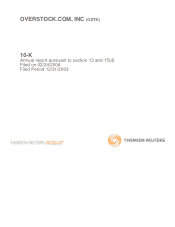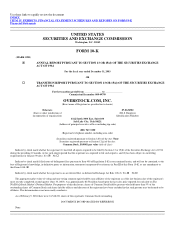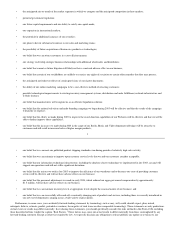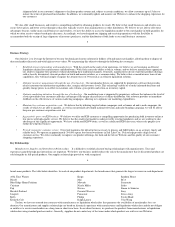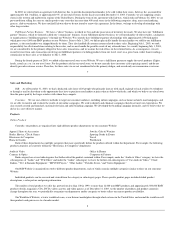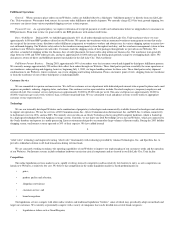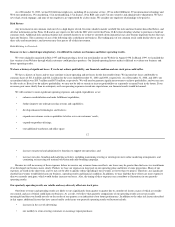Overstock.com 2003 Annual Report Download - page 10
Download and view the complete annual report
Please find page 10 of the 2003 Overstock.com annual report below. You can navigate through the pages in the report by either clicking on the pages listed below, or by using the keyword search tool below to find specific information within the annual report.
online retailers with discount departments such as Amazon.com, Inc., eBay, Inc. and Buy.com, Inc.; and
traditional retailers and liquidators such as Ross Stores, Inc., Walmart Stores, Inc. and TJX Companies, Inc.
As the market for online liquidation grows, we believe that companies involved in online retail, as well as traditional retailers and liquidation brokers,
will increase their efforts to develop services that compete with our online services. We also face potential competition from Internet companies not yet
focused on the liquidation market, and from retail companies not yet operating online. We are unable to anticipate which other companies are likely to offer
services in the future that will compete with the services we provide.
In addition, many of our current and potential competitors have greater brand recognition, longer operating histories, larger customer bases and
significantly greater financial, marketing and other resources than us, and may enter into strategic or commercial relationships with larger, more established
and well-financed companies. Some of our competitors could enter into exclusive distribution arrangements with our vendors and deny us access to their
products, devote greater resources to marketing and promotional campaigns and devote substantially more resources to their Website and systems
development than our company. New technologies and the continued enhancement of existing technologies also may increase competitive pressures on our
company. We cannot assure you that we will be able to compete successfully against current and future competitors or address increased competitive
pressures. See "Risk Factors."
Intellectual Property
We regard our domain names and similar intellectual property as critical to our success. We rely on a combination of laws and contractual restrictions
with our employees, customers, suppliers,
10
affiliates and others to establish and protect our proprietary rights. Despite these precautions, it may be possible for a third party to copy or otherwise obtain
and use our intellectual property without authorization. In addition, we cannot assure you that others will not independently develop similar intellectual
property. Although we are pursuing the registration of our key trademarks in the United States, some of our trade names are not eligible to receive trademark
protection. In addition, effective trademark protection may not be available or may not be sought by us in every country in which our products and services
are made available online, including the United States.
From time to time, we may be subject to legal proceedings and claims in the ordinary course of our business, including claims of alleged infringement of
the trademarks and other intellectual property rights of third parties by our company. For example, in October 2003, Tiffany (NJ) Inc. and Tiffany and
Company filed a complaint against us in the United States District Court for the Southern District of New York alleging that we have distributed counterfeit
and otherwise unauthorized Tiffany product in violation of federal copyright and trademark law and related state laws. The complaint seeks statutory and
other damages in an unspecified amount and injunctive relief. Although we have filed an answer and believe we have defenses to the allegations and intend to
pursue them vigorously, the Tiffany lawsuit is in the early stages of discovery, and we do not have sufficient information to assess the validity of the claims or
the amount of potential damages. These types of claims could result in increased costs of doing business through legal expenses, adverse judgments or
settlements or require us to change our business practices in expensive ways. In addition, litigation could result in interpretations of the law that require us to
change our business practices or otherwise increase our costs.
Third parties have in the past, and may in the future, recruit our employees who have had access to our proprietary technologies, processes and
operations. These recruiting efforts expose us to the risk that such employees will misappropriate our intellectual property.
Additional litigation may be necessary in the future to enforce our intellectual property rights, to protect our trade secrets or to determine the validity and
scope of the proprietary rights of others. Any litigation, regardless of outcome or merit, could result in substantial costs and diversion of management and
technical resources, any of which could materially harm our business. See "Risk Factors."
Government Regulation
All of our services are subject to federal and state consumer protection laws including laws protecting the privacy of consumer non-public information
and regulations prohibiting unfair and deceptive trade practices. In particular, under federal and state financial privacy laws and regulations, we must provide
notice to consumers of our policies on sharing non-public information with third parties, must provide advance notice of any changes to our policies and, with
limited exceptions, must give consumers the right to prevent sharing of their non-public personal information with unaffiliated third parties. Furthermore, the
growth and demand for online commerce could result in more stringent consumer protection laws that impose additional compliance burdens on online
companies. These consumer protection laws could result in substantial compliance costs and could interfere with the conduct of our business.
Moreover, in many states, there is currently great uncertainty whether or how existing laws governing issues such as property ownership, sales and other
taxes, libel and personal privacy apply to the Internet and commercial online services. These issues may take years to resolve. In addition, new state tax
regulations may subject us to additional state sales and income taxes. New legislation or regulation, the application of laws and regulations from jurisdictions
whose laws do not currently apply to our business or the application of existing laws and regulations to the Internet and commercial online services could
result in significant additional taxes on our business. These taxes could have an adverse effect on our cash flows and results of operations. Furthermore, there
is a possibility that we
11
may be subject to significant fines or other payments for any past failures to comply with these requirements.
Employees
•
•

